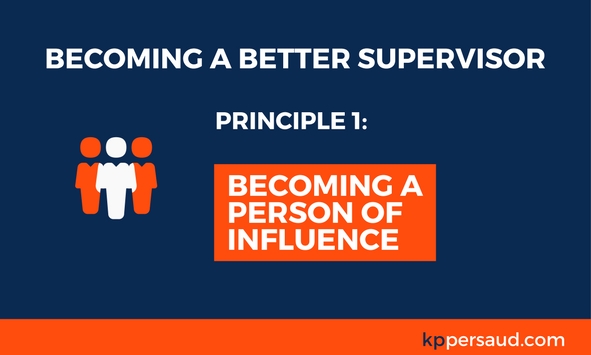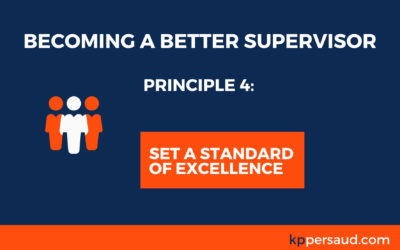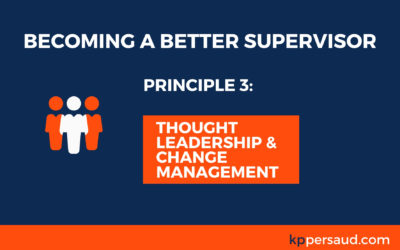
This is Part 1 in an eight-part series on how to become a better supervisor of others in the workplace. Read the introduction to the series here.
I want to discuss the very important principle of influencing others. What do I mean by influencing others and why is this so important?
Influence is not about barking orders at people and getting them to do what you ask. It’s about something much deeper and more meaningful than that.
In fact, if you can become a person of influence, you won’t have to order others around nearly as much. Often, they will already know what you want and will be motivated to take action.
A “person of influence” is an individual who can help change the behavior of another person for a desired purpose. The purpose of the change could be to improve the other person’s performance or the relationship between the two.
There are many ways of influencing another person. Here, I am referring to the process of convincing others that they need to change, that they want to change voluntarily, and that such a change is sustainable over time.
The change in behavior takes the form of:
- stop doing
- start doing
- improve what you are doing; and
- use more of your strengths
So, how do you become a person of influence? There is a formula:

Be:
The “Be” part of the formula is about authenticity and trust. If the other person does not feel you are being authentic, then your interactions will come across as fake. There’s no way of faking authenticity either, which is why any beliefs and values you want the other person to embrace must be genuine.
To develop trust, the other person must not only have trust in your character but also in your competency (i.e., your ability to deliver the end result you are promising). The other person should also feel safe and be willing to open up to you.
Do:
The “Do” part of the formula is about two things. First, it involves what actions you must take to motivate the other person to change. Second, it involves equipping or enabling the other person to actually make the change. In other words, the other person must not only want to change but also have the ability to change. Don’t just tell someone to change–get them to want to change along with the tools to do it.
The motivational drive and the skills required to make the behavior change is best captured in the formula below:

You must focus on helping the other person identify “pain” or “gaps” in his/her existing behavior. Provide feedback regarding the person’s behavior or his/her lack of desired results.
But, it’s not just about avoidance of pain. You must also paint a positive picture of the future too.
Both of these things come down to vision. Give the person a vision for what is possible–both in terms of the pain they could avoid and the benefits they could reap.
As for “Small Steps,” this involves getting the person to take certain actions that will take them towards the larger goal you have in mind. The idea is for the person to experience a series of smaller victories so that the larger goal feels much more attainable.
The “Small Steps” could also include providing incentives and accountability tied to any changes the person makes. You can also enlist the help of others to help motivate the person. This sort of social pressure can go a long way.
Conclusion
Once you learn how to become a person of influence, your ability to supervise others will improve tremendously. You won’t have to spend so much time micromanaging others, as they will already know what you want of them—and their contributions will be much more impactful.
Becoming a Better Supervisor: Part 4 (Set a Standard of Excellence)
Learn about Principle 4 of Becoming a Better Supervisor: Set a Standard of Excellence
Becoming a Better Supervisor: Part 3 (Thought Leadership & Change Management)
Read about Principle 3 of Supervision: Thought Leadership & Change Management.
Becoming a Better Supervisor: Part 2 (Focus & Alignment around Expectations)
Learn about Principle 2 of Supervision: Creating focus and alignment around expectations.
Succession Planning: Doing it Right!
Succession Planning Strategies Learn how to fetch the highest price for your business, mitigate risks, and successfully hand over the reins to the new owner. Transitioning yourself out of your business could be a gut-wrenching nightmare if it is not done...
Becoming a Better Supervisor
How well do you supervise others in the workplace? Whether you’re an executive or a construction foreman, use these valuable tips to improve your supervisory skills.
Want to Sell your Business One Day? Focus on Raising its Value Now.
Imagine the day has finally come for you to sell your business. Maybe you’re ready to retire and move to the beach—or however it is you envision your ideal retirement. How can you be sure you’ll get the most from it?
HAVE A QUESTION OR WANT TO TALK MORE?
Fill out the form and I'll get right back with you.
(319) 721-3175
kp@kppersaud.com

 Hi, I'm KP Persaud...I spent 32 years working as an executive at major companies in the U.S. Now, I help others build better businesses through coaching and training.
Hi, I'm KP Persaud...I spent 32 years working as an executive at major companies in the U.S. Now, I help others build better businesses through coaching and training. 




